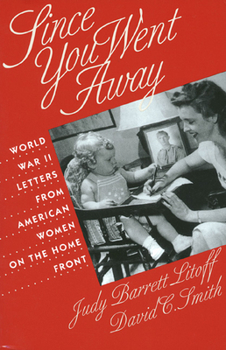Since You Went Away: World War II Letters from American Women on the Home Front
Select Format
Select Condition 
Book Overview
"Last night Mel and I were talking about some of the adjustments we'll have to make to our husbands' return. I must admit I'm not exactly the same girl you left-I'm twice as independent as I used to be and to top it off, I sometimes think I've become 'hard as nails'. . . . Also--more and more I've been living exactly as I want to . . . I do as I damn please."
These tough words from the wife of a soldier show that World War II changed much more than just international politics.]
"From a fascinating collection of letters, filled with wonderfully distinctive human stories, Judy Barrett Litoff and David C. Smith have shaped a rare and brilliant book that transports the reader back in time to an unforgettable era."--Doris Kearns Goodwin, author of The Fitzgeralds and the Kennedys and Lyndon Johnson and the American Dream.
"This is a wonderful volume, full of admirable women struggling in a difficult situation, doing their best for their families and their country. Ah, the memories it brings back Highly recommended for those who lived through the war, and for those who want to understand it."--Stephen E. Ambrose, author of Eisenhower and D-Day, June 6, 1944
"Offering a remarkable view into the lives of ordinary women during wartime, this book will enlighten and catch at the hearts of general readers and cause historians to reconsider how women experienced World War II."-Susan M. Hartmann, author of The Home Front and Beyond.
"From among 25,000 of an estimated six billion letters sent overseas during World War II, Litoff and Smith have culled and skillfully edited a sampling by 400 American women. These letters, starting with one to a seaman wounded at Pearl Harbor, are compelling documents of home-front life in varied ethnic, cultural, and financial milieus. Tragic, touching, and funny, the correspondence is full of prosaic news and gossip about jobs and neighbors, along with accounts of births and intimate allusions to love-making. The stress of separation was intensified for women whose loved ones were hospitalized, or imprisoned as either conscientious objectors or security risks. Some women wrote General MacArthur and others for news of missing men or to obtain details of their deaths. Many of these heartrending documents also express acceptance-and even pride-in the sacrifices required by war."--Publishers Weekly.





